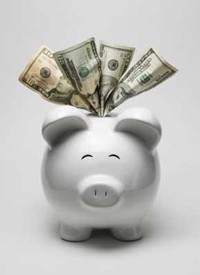
(Photo : Flickr)
A lot of savings advice hinges on automatically setting aside a percentage of your paycheck each month - many experts recommend saving at least 20 percent of your income. This is solid advice in theory. But many people find nearly all of their paychecks consistently going to cover rising costs of living like housing, transportation, debt repayment, groceries and more.
As important as it is to have adequate savings, it can be very daunting to take out a large chunk of each paycheck - or even counterproductive if you then find yourself dipping into savings to cover essentials. Luckily, saving is not an all-or-nothing proposition.
Here are five small ways to save more money each month without breaking the bank.
Automate Savings with an App
Tucking spare change into a bowl or jar, then bringing that container to the bank to cash it in used to be a way of life. But more and more of our payments are electronic nowadays. That's why some savings apps help you automatically move small amounts of money into your savings account throughout the month.
Here's an example: You buy a cup of coffee for $2.75 on a busy morning. An app like Stash, capital or Acorns can automatically round up to the nearest dollar, then move the remainder from checking to a savings or investment account. In this scenario an extra quarter would move into your savings. Taking this small action across a week's or months' worth of purchases can make a big difference - and the idea is that you'll hardly even notice saving such a small, gradual amount at a time.
Deposit Your Shopping "Savings"
Have you ever looked at the bottom of a receipt and found it says you "saved" some amount or percentage? While it's a positive feeling to walk away having paid less than the full price, this amount can be somewhat of an illusion - unless you were to actually deposit that amount into your savings, of course.
Andrew Housser, a debt expert and co-founder of Freedom Debt Relief, recommends seeking out the maximum discounts you can get on items you were going to buy either online or in store, then actually saving whatever you "save."
Cancel Subscriptions You Barely Use
Most of us are guilty of signing up for at least one membership or entertainment platform with good intentions, then finding we utilize it less than we originally thought we would. While it can be tempting to hold onto these subscriptions in the hopes you'll get your money's worth soon, a savvier route is to simply cancel any recurring services you can live without.
Comb through your monthly statements to find these charges, then really think about the value they're providing (or not providing) to your life. Cutting a couple of these can lead to hundreds of dollars in savings by the end of the year.
Plan Out Your Meals in Advance
A little foresight can help you lower your grocery and dining costs while still allowing you to enjoy delicious foods throughout the week. The key is planning your shopping trips and preparing bulk meals - especially those that freeze well. Figure out what you can cook inexpensively in large batches, then make those meals a staple of your home and work meals. Plan to shop when foods are in season and on sale too.
Wait a Certain Amount of Time Before Making a Purchase
It's unrealistic to expect yourself to avoid buying anything non-essential. We're all only human, after all. Extremely restrictive budgeting like this can actually lead to splurges down the line.
Instead, try waiting a certain amount of time before making a purchase. One expert recommends contemplating a purchase for 72 hoursbefore acting on it. Others suggest thinking about the items you want for 24 or 48 hours. By taking a pause, you can overcome the impulse to act quickly in the moment.
These five suggestions are meant to help you save more money each month gradually instead of all at once.
- Contribute to this Story:
- Send us a tip
- Send us a photo or video
- Suggest a correction














































